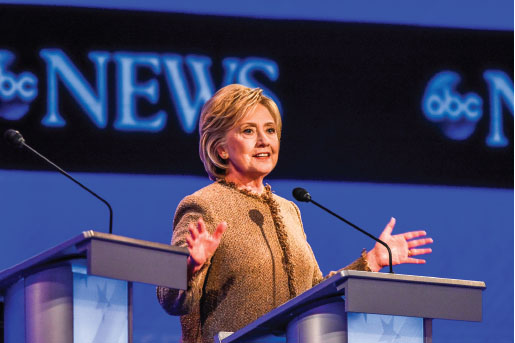Distrust clouds election

Hillary Clinton’s low favorability among voters is concerning many Democrats
The most recent HuffPost Pollster reported that Hillary Clinton is now viewed unfavorably by 55 percent of the electorate, with just 40.2 percent of people viewing her favorably.
In an election where there are no clear crowd favorites, this might not seem so bad.

Distrust – Hillary Clinton’s favorability with the American People has fallen. Photo credit: Google images
However, just to compare, then-Sen. Barack Obama was viewed favorably by 62 percent of voters and unfavorably by just 33 percent at this point in the 2008 presidential cycle.
Even in February 2012, during the closest comparable point in his re-election campaign, he had a net positive favorability rating of 2 percentage points, compared to Hillary Clinton’s current net rating of minus 11, according to the Gallup polls taken during that election.
In March of 2000, George W. Bush also had a high favorability rating of 63 percent.
Hillary Clinton’s name has become synonymous with lies and cover-ups, giving the American people a reason to have such reservations about her leading the country.
Democratic strategist Brad Bannon drew the connection between the struggling poll numbers to separate findings which reflect a high amount of Hillary Clinton distrust.
“The number one reason that her favorability is so bad is that you have large numbers of Americans who say they do not trust her,” Bannon said.
“I could make it sound more complicated than that, but that is really what it is. Voters see her as the ultimate politician, who will do or say anything to get elected.”
Capitalizing on his opponent’s weaknesses and uniquely crafting them into a nickname, Donald Trump recently nicknamed Hillary Clinton “Crooked Hillary,” adding it to his list that already includes Lyin’ Ted, Little Marco and Jeb “Low Energy” Bush.
Like most of Trump’s pet names for the other candidates, he did not have to look far to find such a fatal flaw in this opponent.
The email scandal and the Benghazi situation have haunted Hillary Clinton since her days at the U.S. State Department.
More recently, her refusal to release the transcripts of her paid speeches on Wall Street has added more widespread distrust to her resume and further supports the notion that she has something to hide.
When asked to release the transcripts of those speeches, Hillary Clinton deflected by saying every candidate should have to release transcripts of paid speeches, according to the Huffington Post.
This is perhaps not the best strategy for a candidate simultaneously undergoing an FBI investigation.
According to a CNN analysis, Hillary Clinton and her husband, former President Bill Clinton, collectively earned more than $153 million in paid speeches from 2001 until Hillary Clinton launched her presidential campaign last spring.
The Clintons gave 729 speeches from February 2001 until May 2015, receiving a whopping average payday of $210,795 for each address.
The president should theoretically be someone who is trustworthy and honest, or at least is viewed in such a way by the majority of their voters.
With Hillary Clinton’s favorability at such a low point, not to mention the possibility of her indictment, many wonder if her unpopularity will be enough for her to lose the election to either Trump or Ted Cruz.
Bannon compares this election to outrunning a bear.
“Hillary Clinton doesn’t have to be great,” Bannon said. “She just has to be better than Donald Trump or Ted Cruz.”
However, the irony of entitlement could prove disastrous for Hillary Clinton’s campaign, considering she has lost many young and female voters to Bernie Sanders.
While some may attribute this to common distrust for the “establishment,” a well-informed voter should take note of the facts and the decades of distrust swirling around both Clintons.
A presidential candidate will most likely never be under such scrutiny again after being elected, and if Hillary Clinton cannot display integrity at this point, it should speak volumes about how she will behave if she secures the presidency.
Despite being such a divided party, Republicans still stand a chance in the presidential race.
Voters have more reason now than ever to cast a vote not just for their candidate, but for the principle of what it means to lead and represent our nation.
Rozenblum is an opinion writer.
